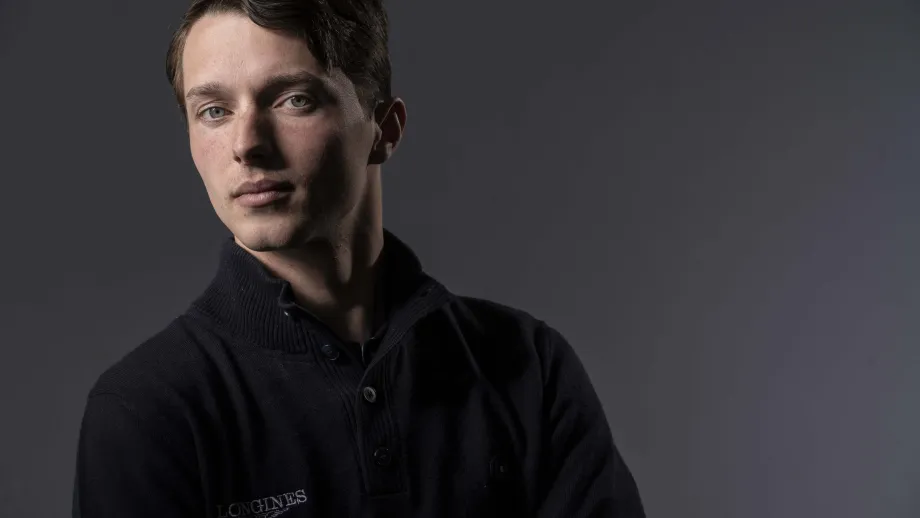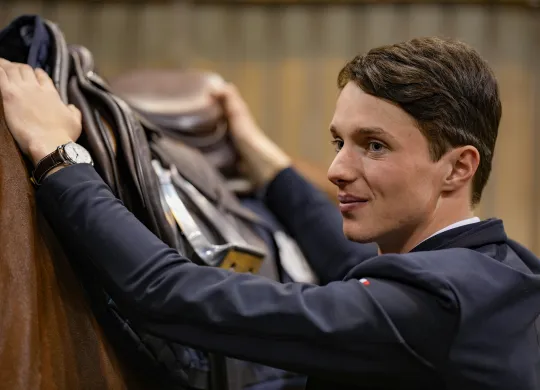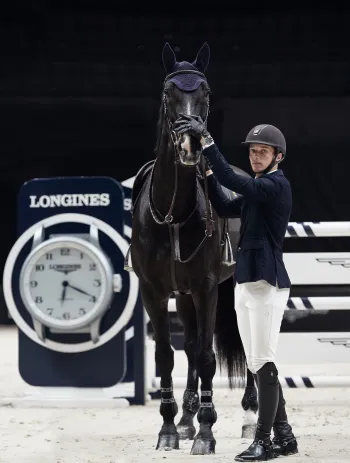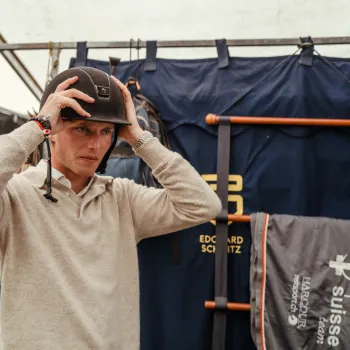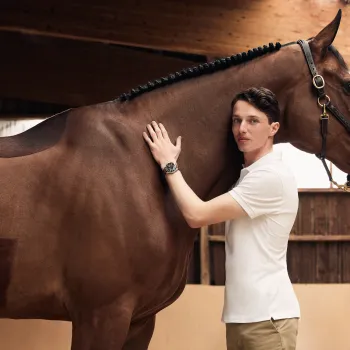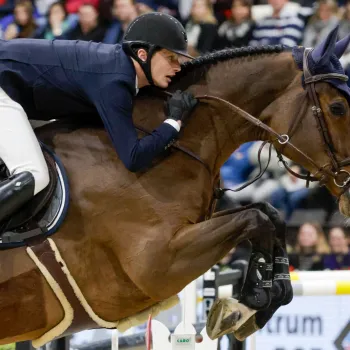You are studying data sciences, and at the same time, you are making headlines worldwide as a show jumper. You are a technical, analytical, structured thinker based on your choice of studies. Are these qualities that also benefit a show jumper?
Studying computer science has always been a balance to show jumping. This duality between my analytical-technical and emotional-intuitive sides is characteristic of me. As a show jumper, you work with horses. You need a lot of sensitivity and emotions.
What skills does a world-class show jumper need?
You have to be a calm person in principle. You work with animals. Horses are flight animals. In our sport, there are always surprises. You have to be able to deal with that. As a rider, it's important to understand why the horse behaves this way and not that way and not jump to conclusions. As a show jumper, you need a lot of patience, sensitivity, and calmness. You also have to be fast on the course. Many show jumpers can jump a course flawlessly and yet will never win a Grand Prix because they are not fast enough. To win races, you have to be fast. Finally, this sport requires a lot of passion. Show jumping takes an enormous amount of time. You have to spend a lot of time with the horses. You must have the passion for the sport and the horses to reach the top.
How do you become a fast rider?
You have to have it in your blood. When you ride fast towards an obstacle, it is like a test of courage. There cannot be any hesitation. This courage already distinguished me as a child. I often took high risks. My first trainers always had to slow me down a little.
What would happen if an amateur rider rode a horse like Gamin? Would this even be possible?
A horse that jumps as extraordinarily as Gamin requires an enormous amount of sensitivity from the rider. An amateur rider would be overtaxed with such a horse. When the horse senses something is wrong, it follows its instincts. The inexperienced rider would then probably give their commands too strongly, so the horse overreacts.
How would you describe your relationship with horses?
A rule of thumb says it is only possible to be successful at the highest level with a horse if you have spent at least half a year with it beforehand. I compare it to a friendship. It takes a lot of time for trust to develop between the horse and the rider. You experience beautiful and difficult moments together. Through a constant process, you get to know each other better and become more responsive to each other's strengths and weaknesses.
How do you create trust in a horse?
There are two aspects to this: You simply have to spend a lot of time with the horse, not just riding. You have to give the horse time to get used to you. When I enter the stable, the horse has to recognize me and know that it has nothing to fear in my presence. Jumping horses travel all over the world. So there must be fixed points in their daily routines, such as the groom or me. Then, the horse finds peace.
On the other hand, there is the time we spend in the saddle as riders. That's where the horse and I always gain experience. Over time, the horse knows what to expect from me. At the same time, I know situations where a particular horse feels comfortable and try to recreate these as often as possible on the course.
What happens on competition day?
I usually travel with two to three horses to a competition, sometimes up to five horses. The morning before a competition, I ride the horses for the first time, spending 40 to 45 minutes on each horse without jumping. I need to know what condition and mood the animals are in. Later on, I walk the course. I go to the stable again two to three hours before the test. The horses are warmed up, again without jumping. I check if the steering wheel and the brakes work, everything I need then in the competition. Half an hour before the course, the horse is warmed up again, this time with some jumps. This session is short, I want the horse to maintain their strength and energy. Its muscles are already warmed up from the last session.
What happens to the horses between those sessions?
The horses are always looked after by their groom, who is always in the stables. Also, the stables are very well supervised at the competitions, so only authorized people are allowed in these zones. I am lucky to rely on an excellent groom who spends much time with the horses. Many riders need this luck. They then spend a lot of time in the stable before the competition, which costs a lot of energy, which is then missing in the competition.
Your horses do not belong to you; they are given to you to ride. Can you elaborate on this?
There is the horse owner. In my case, two people own my horses. The horses are kept in a home stable when not at the show. My six horses are in the stables of Martin and Thomas Fuchs in Wängi. As a rider, I get a share of the prize money I win with the horse. I am responsible for the well-being of the horses. The owner of the horse receives most of the prize money but in return, also pays for the costs of the horse and its acquisition.
In many cases, successful horses are sold by their owner for a profit. Fortunately, this is not the case with me. My two owners enjoy the equestrian sport and do not regard their horses as mere investments. I employ the groom. A big challenge in show jumping is creating an environment for yourself that offers the best conditions for sporting success. There are a lot of players involved.
As a layman, one imagines it difficult when the horse is then sold by the owner in the event of success?
It is indeed very frustrating and emotionally challenging. As a rider, you develop a very emotional relationship with the horse and invest a lot emotionally in these animals. This is the basic prerequisite for sporting success. The horse senses when the rider is not one hundred percent behind it emotionally. If the horses are sold at a high rate to maximize profits, the rider will eventually stop investing so much emotion in the animals. And that puts the success into jeopardy. For example, the owner of Gamin, a businessman originally from Ticino, primarily enjoys the equestrian sport and seeing his horse at competitions. He is also happy to help a young Swiss rider with a horse of this quality and makes it a challenge to find the best possible horse. His goal is sports and not horse-trading.
Your horses are stabled with Thomas Fuchs. Thomas Fuchs is also your trainer. What part has he played in your recent successes?
I have been training with Thomas for almost six years now. All my horses are stabled with him. He is my mentor. I discuss every decision with him. When I was 17, I asked him about a good stable near Zurich during a youth team training. He said there was a good stable, his. To be accommodated with my horses in his stable was a great recognition on his part. It made me very proud. For the first six months, I rode his horses at tournaments. He also advised me on my team's construction and helped me build my system. He is a massive stroke of luck for me. Without him, my successes would not have been possible.
How many horses do you currently work with?
I am currently working with six horses. At the moment, I don't have enough young horses, but we are working on finding a solution.
How do you envision finding this?
Thomas Fuchs is looking for suitable young horses. He then discusses possible options with me, and we show them to potential buyers, who, in an ideal scenario, find a way to make the horses available to me.
This sounds like a strong teamwork. Looking at your competition pictures, one generally has the feeling that there is a strong cohesion among the riders in the Swiss team.
The atmosphere in the Swiss team is excellent. Show jumping is an individual sport, but there are so many different people involved that there always needs to be a well-functioning team in the background. In addition, there are team competitions where the team is in the foreground. We spend much time together at the competitions and share a common passion for horses. This creates a bond. After all, each of us knows that contingencies also characterize our sport. We work with horses. Not everything can always be planned. There are days when the horse doesn't want to go. You have to accept this. You can't force a 600 kg animal over an obstacle. The horse needs to feel some joy and feel good in what it is doing.
What is the fascination of show jumping for you?
Horses have always fascinated me. The most beautiful thing about our sport is the unity between horse and rider. When this feeling of total fusion occurs between horse and rider, when deep mutual trust and understanding lead to horse and rider giving up their caution, when every movement happens naturally without constraint and feels like a single flow, this is simply an indescribable feeling.


